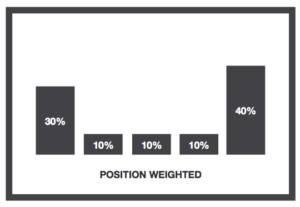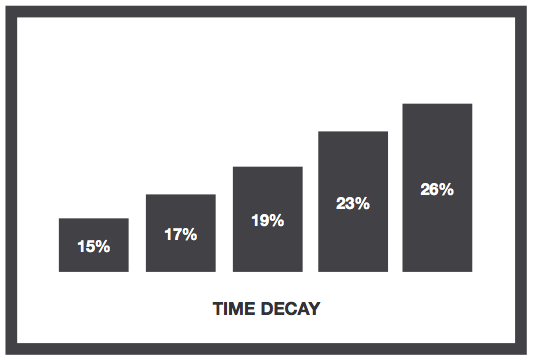The great thing about PPC is that you know the exact performance of every keyword in the account (or at least you can if you get everything set up right). You can now even attribute sales to keywords at the top of the funnel that then create sales from other keywords later on and attribute performance to them. You can do this through attribution modeling which is completely customizable to your business. Some examples are:
Position weighted PPC attribution model:
Time decay PPC attribution model:
This is awesome. It’s also the reason why many very well run accounts max out. By this I mean that it is the reason why those who implement every best practice, who tirelessly mine search query reports for new keywords to add or exclude and who even create a few best practices out of their own creativity eventually run out of room to grow.
The need for profitability on nearly every click leads to over optimization and the cutting out of quality marketing initiatives. Even attribution modeling falls short because you can’t track across browsers, computers, devices, or if someone clears their cache or doesn’t accept cookies in the first place.
In the early stages of a campaign these anomalies are dismissed and optimizations are made assuming these instances have little to no impact on the overall picture. The problem is that they do impact an account. Exactly how much is up to debate, but I think we can all agree that at least 10% of instances have one of the aforementioned issues with tracking and this we under report and over optimize on 10% of our opportunities. On a million dollar a month PPC account that means $100,000 in every month is optimized away from growth for the sake of immediately trackable profits.
That means that instead of just measuring a specific performance metric of a specific keyword, ad group or campaign you should eventually, at least for some time period even if just a month or two, start to slow your optimizations and measure the overall lift (or lack thereof) in conversions after launching something new.
This goes against everything PPPC is about but in the end you may find that you have things in your account that don’t seem to work but that you account as a whole works better when they are on then when they are off.
My suggested method of doing this is Iterative Optimizations where you make one change, sit on your hands for the period of time that will deliver enough data to make a sound decisions and then rinse and repeat. The pace can be slow, the progress can be limited but in the end the thing that matters most will move up and to the right.
Of course, this is not to say that everything you do will eventually have a positive impact on the account. Many times, perhaps more often than not, things that don’t work in themselves do not add to a positive overall account uptick. But finding the things that do beyond the obvious head and long tail keywords and display campaigns is what will continue to move your business into a position of market dominance and the lack of this type of optimization is what will cause an account to slowly decay in performance over time.






